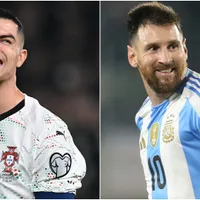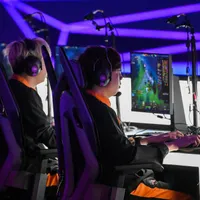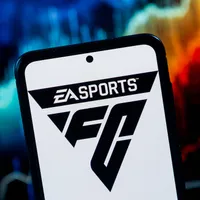COVID changed the soccer world. Clubs couldn’t rely on ticket sales as teams moped around empty, depressing stadiums. Revenue from broadcasting became vital, and streaming services gained more power.
It also changed many teams’, and leagues’, business plans. With empty stadiums, the associated revenue from ticket sales and concessions is dormant. As a result, teams started leaning on revenue made from the league rather than trying to earn money themselves. National revenue, which includes big broadcasting deals, league-wide sponsors and merchandising, started to overshadow local revenue, which includes those concessions, ticket sales and jersey sponsors.
FC Schalke 04 recognized the potential of Esports. It was the first German soccer club to field a League of Legends team. League of Legends is one of the most popular video games in the world. And, in many ways, it is the driving force behind Esports.
Schalke, one of the most historically significant clubs in Germany and even Europe, is now one of the biggest League of Legends sides. It set a trend for clubs to pursue Esports in addition to traditional sports.
With dips in revenue, clubs pursued more than just Esports. Clubs launched projects like cryptocurrency and NFTs or growing social media presence with TikTok, Twitter and more. Esports, however, emerged as the most stable and viable for clubs to proceed with. It connects these clubs to a younger audience in a profitable, and frankly fun, way.
A League of Legends Dream
Much like the Schalke team on the soccer field, Schalke’s Esports team has players that serve certain roles, managing directors and coaches.
Seated in a room in the club’s home stadium, the VELTINS-Arena, Marco Buljevic, Schalke’s head of Esports, smiles. His carefree face does not hint that commanding an Esports division might come with challenges and obstacles. In fact, he makes everything look quite easy.
He says Schalke’s decision to launch itself into Esports was a choice based on several factors.
“Just as the audience of a football club gets older and older, and as younger people get into soccer and are interested in it, the chances are really high that they’re actually also into gaming and Esports. So, it’s actually a very wise idea. It was not a decision where it was like We’re gonna jump in just to see how it goes and you know, have another section in our club. Our ambitions have been clear from the beginning. With Esports, we reach a completely new and different target group and also increase the reach of the club. But, of course, we always want to be successful in what we do and winning titles.”
Schalke’s League of Legends team actually launched in 2016. After buying a franchised League European Championships (LEC) spot for around eight million dollars, they worked towards promotion for three years, before getting to the LEC in 2019.
And when they got to the storied League of Legends league, they went 9-9 against some of the world’s best players. They improved until they started contending for some titles. That was, until 2022, when a debt-ridden Schalke, facing relegation, sold its LEC franchised spot to another team for around 26.5 million euros. It now plays in the Prime League along with a myriad of different DACH-based teams.
Factoring in player salaries, buy-outs, tournament fees, equipment and many other behind-the-scenes factors, Schalke’s League of Legends team seems like a losing business.
Not so down
Unlike traditional sports teams, which use a mix of national revenue and local revenue to make a profit, Esports teams operate almost all off of local revenue. Apparel, including game jerseys and signed memorabilia, is a huge part of their structure, much like traditional sports. Yet two other factors make Esports a risky operation: entertainment and prize winnings.
Winning played a role in Schalke’s business plan. “It was also really important to have success in the competitions, which also we can say we did. We were in the finals of the [League Championship Series] in Madrid, and we went to Athens for the final. We were really close going to [the World Championships]. So, I can say that we achieved that goal,” Buljevic says, glowing with pride.
A Worlds appearance would have likely given them more revenue to work with, and their success in the LEC helped them attract sponsors and recognition. Entertainment, though, might be the most important solution.
“The entertainment part is also really important. To be really interesting for sponsors and partners means we have to have a department for content.”
When Schalke still held a LEC spot, they not only had to move around rosters, but also worked on increasing their audience. Other games outside of League of Legends play a role in building that audience.
Schalke extends Esports reach into FIFA
Schalke’s FIFA team remains as successful, if not more so, than their League of Legends team. They’ve placed near the top in several high-level events, including a quarterfinals appearance in the FIFAe Club World Cup in 2022. With suave management, including contract renewals, player signings and team pairings, Schalke has excelled in the always-changing FIFA Esports business.
“The movement within the scene is quite fast because the contracts are generally not that long term as in most traditional sports leagues where you sometimes see multiple year contracts of a certain player with a team. ]I have a feeling that more players jump into the scene really early. Generally, you don’t have a lot of older players in the Esports scene. Meaning, a career of someone who’s 25 is probably on the decline a bit already,” Buljevic explained.
“However in traditional sports one’s career usually goes up from that point and you’ll reach your peak around 30. That’s not the case in Esports.”
Schalke’s balance of staying competitive and churning out content on social media platforms makes them one of the most avant-garde soccer teams turning to Esports. By posting to Twitter and Facebook, making vlogs on YouTube and even hosting a Discord server, the team continues to attract many younger fans.
Troubles throughout
One key thing that gets in football teams’ way is the initial adventure into Esports. Although the entire Premier League has a FIFA league and many German teams play in the eClub World Cup, it’s small compared to the club football landscape. One key reason is because of franchising. And no, it’s nothing like the proposed European Super League.
Take the competitive VALORANT scene. Although there are several teams involved in the yearly seasons, Riot Games (the developer) wants to make a league format of 10 teams for North America, 10 for Europe, and 10 for Asia. Although it reminds some of the Super League that shocked football fans to their core at first, there is an extensive qualification process to get from anonymity to the big leagues. It may take years to climb through the Ascension League, but teams have an opportunity if they can field winning teams.
The only problem is that most don’t have time for that. Unless the competition promised billions of dollars at its highest level, football clubs have reason to be skeptical about investing millions of dollars for only a glimmer of success and years of constant rebuilding. It’s why Real Betis and Besiktas left the VALORANT scene after getting rejected from a partnership slot.
Esports is also a long-term commitment for something that won’t promise profit right away. Although Schalke’s motives for starting weren’t money-oriented, they soon realized how important money was to their operation. “Buliding this infrastructure really took some time. Afterward we let this business case roll out,” Buljevic says about Schalke Esports’ early stages. According to Buljevic, Schalke required gaming houses, player apartments, professionals to help the roster’s performance, and content advisors.
What could it mean for soccer?
With the birth of its Esports teams, Schalke has a new way to market its brand to young fans while also putting a foot into the door of a growing, profitable young industry. Teams in America and Europe are signing FIFA players and promoting gaming-related content tailored to teens. It helps the club familiarize itself with the younger generation and gain a fair bit of attention on social media.
And yes, we could see Schalke’s business plan employed throughout the world of soccer, with FIFA working as the gateway for soccer teams into a wider world of Esports. Manchester City fields FIFA and Fortnite teams, while Paris Saint-Germain sponsors Dota 2 and FIFA sides.
Not only that, but the rise of Esports in soccer changes how media looks at FIFA coverage. Although it’s barely covered in traditional Esports sites and never covered on ESPN or FOX, 15 or 20 years down the line, we could be discussing the eChampions League or FIFAe World Cup on First Take (or World Soccer Talk itself).
Schalke dipping its toe into Esports’ waters is monumental. It was important in 2016 when the club bought its LEC slot and now in 2023. There’s a lot of money to be made from Esports, and Schalke has been one of the first to recognize it.
PHOTO: IMAGO / Lutz von Staegmann / FUNKE Foto Services














